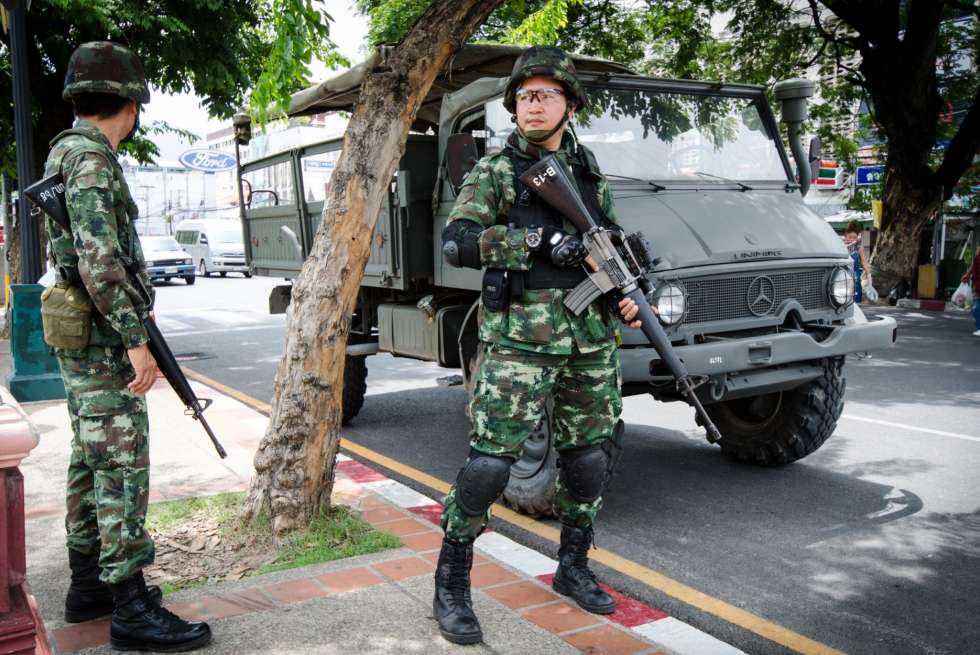Revisiting “People’s Politics”
From the Series: The Wheel of Crisis in Thailand
From the Series: The Wheel of Crisis in Thailand

At the end of 2013, people came out on the streets of Bangkok to protest the so-called blanket amnesty bill, proposed by the government led by Pheu Thai prime minister Yingluck Shinawatra. The bill sought to give amnesty to anyone involved with political conflicts in Thailand since 2004, and to anyone accused by the 2006 coup-appointed committees. Interestingly, both opponents and supporters of the former Prime Minister Thaksin Shinawatra were united against it but on completely different grounds. Those who did not want to see Thaksin return to power did not want the amnesty bill to free him from his corruption charges. On the other hand, those who were sympathetic to the Red Shirts, a group largely composed of supporters of Thaksin, did not want to absolve the authorities who violently suppressed the Red Shirt protesters in 2010 from their responsibility for the deaths of nearly a hundred protestors.
The former group, the anti-amnesty-bill-cum-anti-Thaksin protesters, evolved into the People’s Democratic Reform Committee (PDRC) and staged prolonged demonstrations on several streets in Bangkok aiming to oust the government at any cost. Amidst their effort to redefine “democracy” to suit what they saw as the unique characteristics of Thai society, the PDRC rejected and disrupted democratic elections in February 2014 that would potentially bring Thaksin’s allies to power again. They insisted that political reform to get rid of corrupt politicians should take place before a new election. They also hinted that a call for military intervention into politics might be appropriate to solve the entrenched dispute.
Among this group, many were current or former human rights and development non-governmental organization (NGO) workers who have worked to protect human rights and to promote social justice and “people’s politics” (kan muang pak prachachon), which emphasizes the notion that people should have increased participation in policy-making processes. Many of these NGO workers joined the PDRC both as rank-and-file members and as leaders, especially in one of its factions, the Student and People Network for Thailand's Reform (STR). A few years earlier, they also joined the anti-Thaksin movement under the name of the People’s Alliance for Democracy (PAD) who, in the same vein as the PDRC, aimed to bypass the democratic system by asking for the monarchy’s nomination of a new prime minister and for military intervention.
The decision of the human rights and development NGO workers to join these two anti-democracy struggles is often explained as a matter of strategic choice. Many organizations and individuals plunged into the PAD and PDRC protests, seeing them as the only way to get rid of the Thaksin government, the populist policies and dictatorial style of which they saw as a threat to democracy and to rural livelihoods. As Kengkij and Hewison (2009) document, some NGO workers claimed they preferred to side with a “necessary evil” (the PAD) to get rid of Thaksin, despite being reluctant at first about the PAD’s proposal to invite the king to nominate the next prime minister. Their continued support for the anti-Thaksin movement, despite its increasing use of violence and undemocratic ideology, their support for—or indifference about—the military crackdown against Red Shirt protesters in 2010,1 and their endorsement of the coup government all demonstrate the need to revisit the NGO movement’s approach.
The current political conflict thus brings to light the underlying anti-democratic beliefs of developmentalist NGOs in Thailand. While claiming to work for the underprivileged through “people’s politics,” Thai NGOs predominantly adopt a communitarian approach to development commonly called the “community culture” approach (wattanatham chumchon), which includes a preference for rule by people with higher moral authority rather than elected representatives. That approach, with its focus on cultural values, also emphasizes the distinctiveness of Thai culture. Those who insist on democratic principles are then branded by NGOs as ignorant of Thai culture and of how democracy should operate in a specifically Thai cultural context.
In the current political conflict, the idea of “people’s politics” is therefore contentious and does not necessary equate the empowerment of people with the expansion of democracy. It remains to be seen whether NGOs will change their attitude towards military government, especially now with the military’s non-participatory effort to accelerate development projects that affect rural livelihoods and its increasing use of force against grassroots communities in conflict with state agencies (see for example, the eviction of members of the Non Din Daeng community and the clash with anti-mining advocates in the Loei province in July 2014). It will also be interesting to see how, if it is taken up at all, the issue of state violence against a pro-democratic movement will be addressed by the NGOs. In the past few years, the reform of criminal justice has always been included in the agenda of meetings and seminars on political reform organized by Thai NGOs. Nevertheless, there is rarely any mention of the need to address the problem of state violence against the Red Shirts or pro-democracy movements.
1. Examples include a former NGO worker on land rights who wrote a poem in his blog a few days before the crackdown on May 19, 2010 of the Red Shirt demonstrations, calling on Abhisit Vejjajiva to wage a “war” on the protesters. One prominent senior human rights activist, in a television interview during the May 2010 crackdown, claimed that the Red Shirt protest was an armed conflict and that therefore the government could legitimately use force to deal with them (field notes, May 18, 2010).
Kengkij Kitirianglarp and Kevin Hewison. 2009. “Social Movements and Political Opposition in Contemporary Thailand.” Pacific Review 22, no. 4: 451–77.